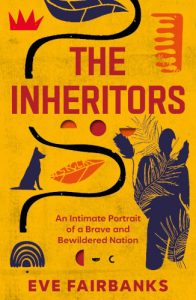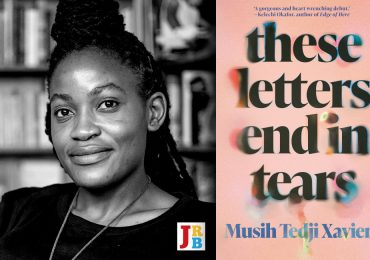The Inheritors by Eve Fairbanks is historical storytelling done well, writes Wamuwi Mbao.

The Inheritors
Eve Fairbanks
Jonathan Ball Publishers, 2023
David Byrne sings of looking down on a bit of flyover state, everything made tiny from his viewpoint in the air. He surveys the expanse of country and says,
I wouldn’t live there if you paid me
I wouldn’t live like that, no sirree
I wouldn’t do the things the way those people do
I wouldn’t live there if you paid me to.
Reading Eve Fairbanks’s capacious book The Inheritors from the dismal standpoint of South Africa in 2023 put me in mind of that Talking Heads song. Living out the early third decade of the twenty-first century in a myth-wreathed country that is fracturing and splintering infrastructurally, it’s difficult to find much that is redeeming about the smallness of our tired experiment. We know it all too well, every chapter newly appalling in its degradations and deprivations. There are no essential truths and no easily yielded reflective conclusions to be drawn about what we have come to call, for want of anything better, the story of our transition to democracy. It is, after all, a story that is still unspooling like a janky telenovela: the effects of that noisy twentieth century catastrophe resisted superseding.
With The Inheritors, Fairbanks takes a story-first approach to wondering what to do with all our history, and the ways that leviathan past affects how we live now. Running to three-hundred-and-sixty-odd pages, The Inheritors pays sustained attention to the stories of three South Africans reckoning (has any review on the subject of post-apartheid South Africa ever not used that word?) with the long after of white South Africa’s bad experiment. The book follows the arc of these three lives via a three-part structure. Dipuo, a Black woman who grew up under apartheid and became an activist in the turbulent eighties, forms one lynchpin for the book; her daughter Malaika, is another; on the other end, we have Christo, the white Afrikaans man who signs up to the great white war effort just as the conclusion of the Cold War brought the show to a sudden end.
We open with Malaika, a young Black girl who has grown up in that ideologically rundown concept, the New South Africa. Malaika attends a formerly whites-only school, bussing in from the impoverished Soweto neighbourhood where she lives with her mother. The contrasts and overlays of life between Dipuo, who was an activist in the turbulent nineteen-eighties and struggles to find her place in the sun post-1994, and Malaika, who blossoms into an outspoken activist in her own right, are particularly interesting. While Christo’s is perhaps the most conventional of the three strands (there is no shortage of white-man-in-wartime tales in South African prose, theatre and film), his story of awkwardly readjusting to life after a short and dramatic stint as a conscript and member of 32 Battalion is an empathic study of the way white South African anxieties have evolved over time.
Fairbanks foregrounds her reportage quite deliberately. She interleaves her own anecdotes, recollections, and encounters with those of her communicants, who are given to bouts of garrulousness, or occasionally reticent. They clam up when something becomes too difficult to speak about, and their difficulty is itself part of the narrative in a way that draws the reader in. The rhythms of thinking and feeling with memory exist on the page in a compelling way. The complexities of Malaika’s life are materially riven by different difficulties and challenges, even as her existence and access to opportunity gives lie to those who would say that life was better under apartheid. She is, in a real sense, the inheritor of the freedoms her mother struggled for. But across the narrative way, what Christo is bequeathed by the new dispensation is a sense of uncertainty about his place in the world without the bedrock of white supremacy’s founding fibs.
There is a tendency, with longform narratives about South Africa’s sociohistorical situation, to want to take the magisterial purview, and to display scholarly ritual in mapping out the contours of this country’s long story. Often, this takes the form of a nervous clinging to data, as though the house of lived experience, however humanising, is thought too insubstantial if not propped up by the exactitude of hard facts. There are any number of books where leaden sociological fact has been spackled on thickly, to nobody’s great benefit. Many texts in this genre tend to overwhelm with their decisive comprehensions about the exchange of power in South Africa, and the suffering and grief occasioned thereafter.
Not so with The Inheritors. Fairbanks is an observer whose conclusions are provisional where they are present. If she is revealing less about herself than you may think, you nevertheless sense her listening at every turn, stitching what her main interlocutors say to an impressive cast of conversationalists (there is a daunting glossary of names collected at the back of the book). This is historical storytelling done well, with a good, lucid prose style and a simple economy of narrative, in which Fairbanks does not dawdle on common ground. Of the 1976 riots, she writes,
As the Sowetan students marched, the police shot and killed a twelve-year-old protester. Protests spread to other cities, and the following year, hundreds of Black children […] refused to show up for the new term. Students publicly burned their ID-cards and spray-painted their former school walls with the name “MANDELA.”
Or here, describing the unpromising origins of European settlement at the Cape:
Many of the Cape’s early settlers were people European society rejected. It had few natural harbors, meaning voyagers who survived the months-long sea journeys sometimes lost their lives in sight of landfall as their ships broke apart on the rocks. And it was inhabited by people of color, whom missionaries and European “scientists” disliked.
There is an easy fluency to this kind of writing, with its mix of flat affect and shocking detail that swerves around the boilerplate items and performs its telling in the way a Laurie Anderson or a Speedboat-era Renata Adler would. Fairbanks doesn’t force connections between these narratives, instead allowing them to ping off one another. It’s a mode of writing that seems better suited to the abstractions of our social picture than other forms of sense-making. After all, where else is history but in the stories people tell about what happened to them, what was done or what they did?
There are places where this storytelling occasionally loses its calibration. When Fairbanks, musing on the Black Diamond phenomenon, says that ‘often the first thing a university graduate did with his paycheck was make a down payment on a shiny new Peugeot’, it clangs with the all the hollowness of a particular made general. (I’m sure Peugeot, a perennial underperformer in a market suspicious of companies that divested from South Africa during the nineteen-eighties, would have been thrilled at this success if it existed.)
There is also the sense, a feeling that may be entirely my own, that Fairbanks’s comparison between the histories of South Africa and North America is a slippage between things that look similar but have somewhat different logics underpinning them. The comparison adheres in a satisfying way, but it risks revealing itself as the ah-there-it-is conceit of South Africa as a lesson for how America’s persistent racial psychosis will turn out. Placing two things in proximity to each other confers upon them a stronger sense of relationship than might actually be present.
It is of course necessary to see the long trajectories of change when trying to understand human stories. In this regard, the intimacy of The Inheritors is its great asset. By peering over the author’s shoulder as she sketches these portraits of living in proximity to the national idea, we glimpse what we cannot see from our own remote perches. It makes it easier to imagine being here when we see how other people do it.
- Editorial Advisory Panel member Wamuwi Mbao is an essayist, cultural critic and academic at Stellenbosch University. Follow him on Twitter.






One thought on “‘Where else is history but in the stories people tell?’ Wamuwi Mbao reviews The Inheritors by Eve Fairbanks”